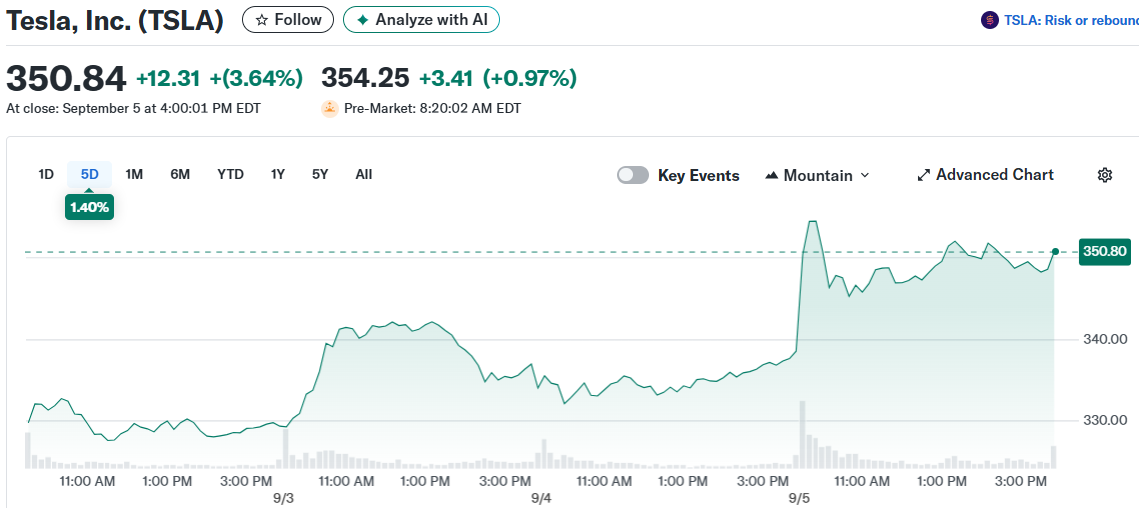TLDR
- Tesla’s US market share fell to 38% in August, the lowest since October 2017
- Tesla’s growth slowed to 3.1% while the broader EV market grew 14% in August
- Competitors like Hyundai, Toyota, and Volkswagen are offering better incentives and deals
- Tesla board proposed unprecedented $1 trillion pay package for Elon Musk tied to company reaching $8.5 trillion valuation
- Company is focusing on robotaxis and humanoid robots instead of new affordable EV models
Tesla’s grip on the US electric vehicle market is loosening. The company’s market share dropped to 38% in August, marking the first time it has fallen below 40% since October 2017.
Tesla’s US market share falls to near 8-year low as EV rivals gain ground pic.twitter.com/DpW1IMj9SO
— Mike Zaccardi, CFA, CMT 🍖 (@MikeZaccardi) September 8, 2025
The decline comes as Tesla faces growing competition from traditional automakers rolling out new EV models. While Tesla’s sales rose 3.1% in August, the broader EV market grew 14%.

Tesla once controlled more than 80% of the US EV market. Now it’s watching rivals eat into its dominance with attractive deals and fresh offerings.
Competition Heats Up
Competitors are winning customers with better incentives. Hyundai, Honda, Kia, and Toyota rolled out higher incentives than Tesla in July, driving their EV sales up between 60% and 120%.
Volkswagen saw sales jump more than 450% in July from the previous month. The German automaker is offering deals like zero down payment and free fast-charging to lure buyers away from Tesla.
One Bay Area tech worker chose a Volkswagen ID.4 over a Tesla Model Y after being offered an attractive lease price and free charging. “It felt like the deal of the market,” he said.
Tesla’s pricing strategy is under pressure. The company has been cutting prices to support demand, but this squeezes profit margins and worries investors.
The company faces a tough choice: support sales with profit-destroying incentives or maintain profits while giving up market share. So far, Tesla appears to be losing on both fronts.
Focus Shifts to Robotics
Tesla has turned its attention away from new car models. The company is focusing on building robotaxis and humanoid robots instead of developing cheaper electric vehicles.
This shift comes at a critical time when competitors are launching new models. Tesla’s last new vehicle was the Cybertruck pickup in 2023, which hasn’t matched the success of the Model 3 or Model Y.
The Model Y, once the world’s best-selling car, received a refresh that failed to meet expectations. Tesla is on track for a second consecutive year of sales decline.
“When you’re a car company, when you don’t have new products, your share will start to decline,” said Stephanie Valdez Streaty from Cox Automotive.
Tesla’s trillion-dollar valuation depends on its robotics and AI bet paying off. The company’s board proposed a record $1 trillion pay package for CEO Elon Musk on Friday.
The deal would only unlock if Tesla reaches a market value of $8.5 trillion within 10 years. This ties the company’s future growth directly to Musk’s ability to deliver on these ambitious projects.
Political factors may also be hurting Tesla’s brand appeal. Musk’s right-wing political work and association with President Trump has created some brand challenges.
Sales data shows the trend continuing into August. Tesla’s market share in July fell to 42% from 48.7% in June, representing the sharpest drop since March 2021.
The August preliminary data shows Tesla’s market share fell further to 38%, with growth slowing while competitors accelerated.






